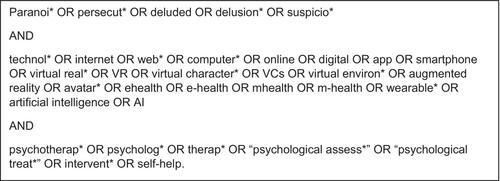Paranoia is relatively common but can lead to significant distress, impairment and need for care. Digital technologies offer a valuable extension to service provision and are increasingly being integrated into healthcare. This systematic review evaluated feasibility, acceptability, and effectiveness of digitally enhanced psychological assessments and treatments for paranoia across the paranoia continuum (PROSPERO: CRD42023393257).
Databases PsychINFO, EMBASE, MEDLINE and Web of Science were searched until 12 June 2023; the Effective Public Health Practice Project (EPHPP) quality assessment tool evaluated studies; and a narrative synthesis was conducted.
Twenty-seven studies met inclusion criteria (n = 3457, 23 assessment and 4 treatment, 2005–2023, most in Europe). Technologies included virtual reality (VR, n = 23), experience sampling methodology (ESM, n = 2), an app (n = 1) and a combination of VR and ESM (n = 1). Assessments involved monitoring paranoia under various virtual conditions or in everyday life. Treatments were generally integrated with Cognitive Behaviour Therapy (CBT), which involved using VR to test out threat beliefs and drop safety behaviours or using an app to support slowing down paranoid thinking. EPHPP ratings were strong (n = 8), moderate (n = 12) and weak (n = 7).
Digitally enhanced assessments and treatments showed promising acceptability, feasibility and treatment effectiveness. Limitations of studies include small sample sizes, lack of comparison groups and long-term data and limited randomised controlled trials. Results support the potential future integration of VR in the assessment of paranoia and show promise for treatments such as CBT, although further clinical trials are required. Investigation of other technologies is limited.



